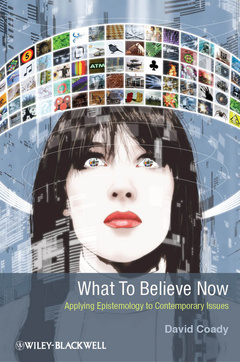Description
What to Believe Now
Applying Epistemology to Contemporary Issues
Author: Coady David
Language: English
Subject for What to Believe Now:
Keywords
Epistemic democracy, conspiracy theories, rumors, blog, social media, communication, facebook, twitter
Publication date: 04-2012
224 p. · 17.5x22.6 cm · Paperback
Approximative price 82.18 €
In Print (Delivery period: 14 days).
Add to cartPublication date: 04-2012
216 p. · 16x23.4 cm · Hardback
Description
/li>Contents
/li>Biography
/li>
Coady calls for an 'applied turn' in epistemology, a process he likens to the applied turn that transformed the study of ethics in the early 1970s. Subjects dealt with include:
- Experts-how can we recognize them? And when should we trust them?
- Rumors-should they ever be believed? And can they, in fact, be a source of knowledge?
- Conspiracy theories-when, if ever, should they be believed, and can they be known to be true?
- The blogosphere-how does it compare with traditional media as a source of knowledge and justified belief?
Timely, thought provoking, and controversial, What to Believe Now offers a wealth of insights into a branch of philosophy of growing importance-and increasing relevance-in the twenty-first century.
Preface ix
1 Introduction 1
2 Experts and the Laity 27
3 Epistemic Democracy 59
4 Rumors and Rumor-Mongers 86
5 Conspiracy Theories and Conspiracy Theorists 110
6 The Blogosphere and the Conventional Media 138
7 Conclusion 169
Postscript: Government Surveillance and Privacy 175
References 188
Index 197
David Coady is a lecturer in philosophy at the University of Tasmania, Australia. He has published widely on topics in applied epistemology, including expertise, conspiracy theory, rumor, and the blogosphere. He is the editor of Conspiracy Theories: The Philosophical Debate (2006) and he has also published on metaphysics, the philosophy of law, police ethics, the ethics of horror films, and the ethics of cricket.

